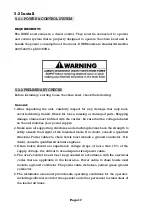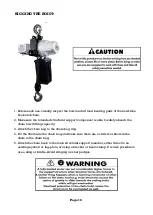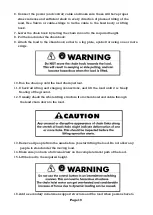
Page 24
7. Maintenance and Adjustment
7-1 Inspections & Maintenance
To maintain continuous and satisfactory operation, a regular inspection procedure must
be initiated to replace worn or damaged parts before they become unsafe. Inspection
intervals must be determined by the individual application and are based on the type
of service to which the hoist will be subjected to the degree of exposure to wear,
deterioration or malfunction of the critical components.
The type of service to which the hoist is subjected can be classified as Normal, Heavy,
or Severe.
Normal Service:
Involves operation with randomly distributed loads within the rated
load limit, or uniform loads less than 65% of rated load for not more than 25% of the
time.
Heavy Service:
Involves operating the hoist within the rated load limit which exceeds
normal service.
Severe Service:
Normal or heavy service with abnormal operating conditions.
Two classes of inspection- frequent and periodic – must be performed.
Frequent Inspections:
These inspections are visual examinations by the operator or
other designated personnel. Records of such inspections are not required. The frequent
inspections are to be performed monthly for normal service, weekly to monthly for
heavy service, and daily to weekly for severe service, and they should
Include those items listed in below.
Periodic Inspections:
These inspections are visual inspections of external conditions
by an appointed person. Records of periodic inspections are to be kept for continuing
evaluation of the condition of the hoist.
Periodic inspections are to be performed yearly for normal service, semi-annually for
heavy service and quarterly for severe service, and they are to include those items
listed in below.
CAUTIONS:
Any deficiencies are to be corrected before the hoist is returned to
service. Also, the external conditions may show the need of disassembly to permit a
more detailed inspection, which, in turn, may require use of nondestructive type testing.
Summary of Contents for DU903
Page 1: ...Page 1...



































